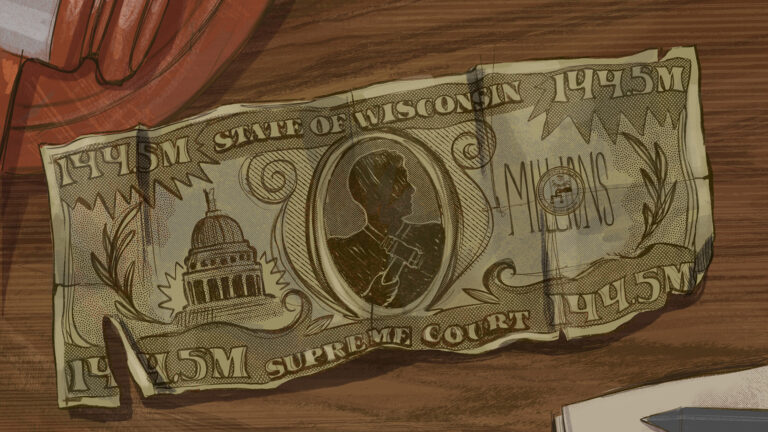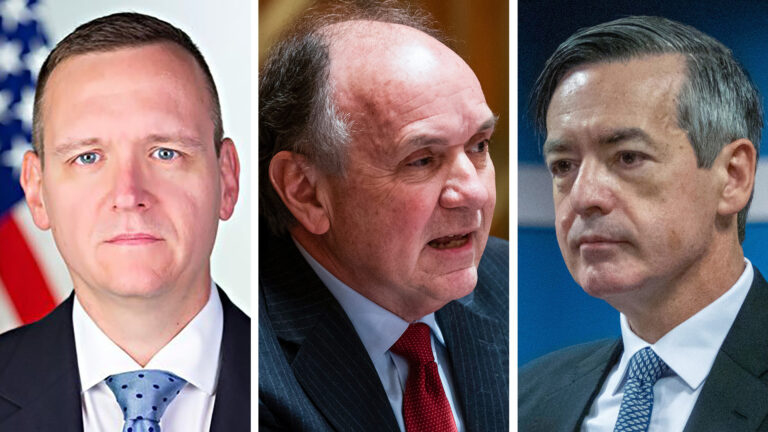Frederica Freyberg:
Now to the state budget recommendation for transportation. The transportation secretary is requesting a suite of hikes in taxes and fees in the current $7 billion budget to fill an outstanding budget hole of $680 million and move forward with projects. Recommendations include $751 million more in taxes and fees, including a 5 cent increase in the gas tax, a new car fee of 2.5% and registration fees that would increase by $50 for hybrid and electric cars. In addition, the budget would rely on $800 million in borrowing and nearly $575 million in general purpose revenue. Also under consideration, toll roads and fees based on miles driven. There are some big numbers with big implications. We turn now to Todd Berry, president of the Wisconsin Taxpayers Alliance. Todd, thanks a lot for being here.
Todd Berry:
Thank you.
Frederica Freyberg:
First, I do want to ask you about the state fiscal report just out this week showing that $2.2 billion gap between spending and revenues. What’s your reaction?
Todd Berry:
Well, this is the traditional statutorily-required November 20 report. The Department of Revenue does estimates for two years and those are reasonably useful. But the other side of the thing that they release is spending requests, and so that always prompts headlines of huge deficits. Well, you know, just remember they’re not going to grant all the requests. So I think last time around at this time the governor ended up cutting about a half billion dollars from requests in each year. So clearly there’s going to be a lot of scaling back. The more interesting number to me, because it’s more real, was that they’re suggesting we’ll end this fiscal year with a minus $132 million deficit, which is the first time we’ve heard that.
Frederica Freyberg:
But we talk about these agency requests and how big they might be. If budget writers have to kind of take out the knives to pare down this stuff, doesn’t this really kind of pit things like schools, we’ve just heard from Tony Evers, and roads?
Todd Berry:
Of course. I mean, that’s what budgeting and politics is all about, is you have a bunch of wants and needs and wishes and you put them all out there and the political process tries to reconcile.
Frederica Freyberg:
So where do you think they’ll go to get the money they need, though?
Todd Berry:
Well, I think this budget is sort of like the last one and the one before that. And that is, Medicaid is first in line. It eats up most of the available money. And then the crumbs sort of get scattered around for everybody else. Last time that meant there was some new money for schools. That was pretty much it. Everybody else was pretty much on hold.
Frederica Freyberg:
Getting back to the transportation budget, which we led with, what’s your first impression when you look at those numbers?
Todd Berry:
I don't look so much at the little fees and everything, I look at the two big numbers you cited, the amount of borrowing, and the amount of the general fund transfer. I mean, supposedly the transportation fund is a segregated fund and is funded by user fees for transportation, and we don’t go to the general fund historically for that. And yet we went to the general fund for over $400 million in the last budget. Now we’re going to go to the general fund for closer to $600 million. The bonding and the fund raid or whatever you want to call it suggests that we still have an underlying transportation finance problem that we haven’t come to grips with.
Frederica Freyberg:
So last year they bonded $990 million. They’re asking for $800 million. What are the implications of that?
Todd Berry:
Well, I’m not one to say that states shouldn’t bond, and in fact we borrow for our personal infrastructure, for houses, maybe for cars. So it’s more a question of what else is going to be in the state’s total borrowing package and what’s the total amount. You don’t want that to get too much larger just because you want to keep it manageable.
Frederica Freyberg:
Now, I know that those are the two big items for you, the GPR and the bonding. But for an administration that wants to lower taxes, and we expect they will, how heavy a lift is this recommendation with its $751 million in hike in taxes?
Todd Berry:
The governor has said this is not his proposal. It’s the department’s. To be honest, and I think I was quoted this in the press, saying, you know, are we trying too hard? We have, you know, this fee and that tax and this change in the tax and we go on with all these kinds of little proposals, and we do have an existing source of revenue. It’s not popular, but it’s called the gas tax. And we haven’t increased it in quite a while. And it’s going to make people angry, but it would be the cleanest and simplest. And sometimes there's something to be said for transparency in how you do things.
Frederica Freyberg:
You’re right. There are these things in there like registration fees, for example, for the hybrid or electric cars that go up by $50 and other kinds of fees, for buying a new car and that kind of thing. And at a certain point I would think the taxpayer would say, really? Another one? You just want, as you say that transparency.
Todd Berry:
That’s sort of a strategy question for them. Are they better off, if they’re going to take money, to ask once and take it, or to sort of do it the old pecking by the thousand ducks kind of approach.
Frederica Freyberg:
Well, I guess we wait and see what the governor does with this. Todd Berry, thanks very much.
Todd Berry:
Thank you.
Search Episodes
News Stories from PBS Wisconsin

Donate to sign up. Activate and sign in to Passport. It's that easy to help PBS Wisconsin serve your community through media that educates, inspires, and entertains.
Make your membership gift today
Only for new users: Activate Passport using your code or email address
Already a member?
Look up my account
Need some help? Go to FAQ or visit PBS Passport Help
Need help accessing PBS Wisconsin anywhere?

Online Access | Platform & Device Access | Cable or Satellite Access | Over-The-Air Access
Visit Access Guide
Need help accessing PBS Wisconsin anywhere?

Visit Our
Live TV Access Guide
Online AccessPlatform & Device Access
Cable or Satellite Access
Over-The-Air Access
Visit Access Guide
 Passport
Passport


















Follow Us